CSW67 UN Women Side Event Highlights Need for Accelerating Action to Bridge the Gender Gap in the Digital Economy
Date:
Author: Xiaerbati Daositeke and Di Liu
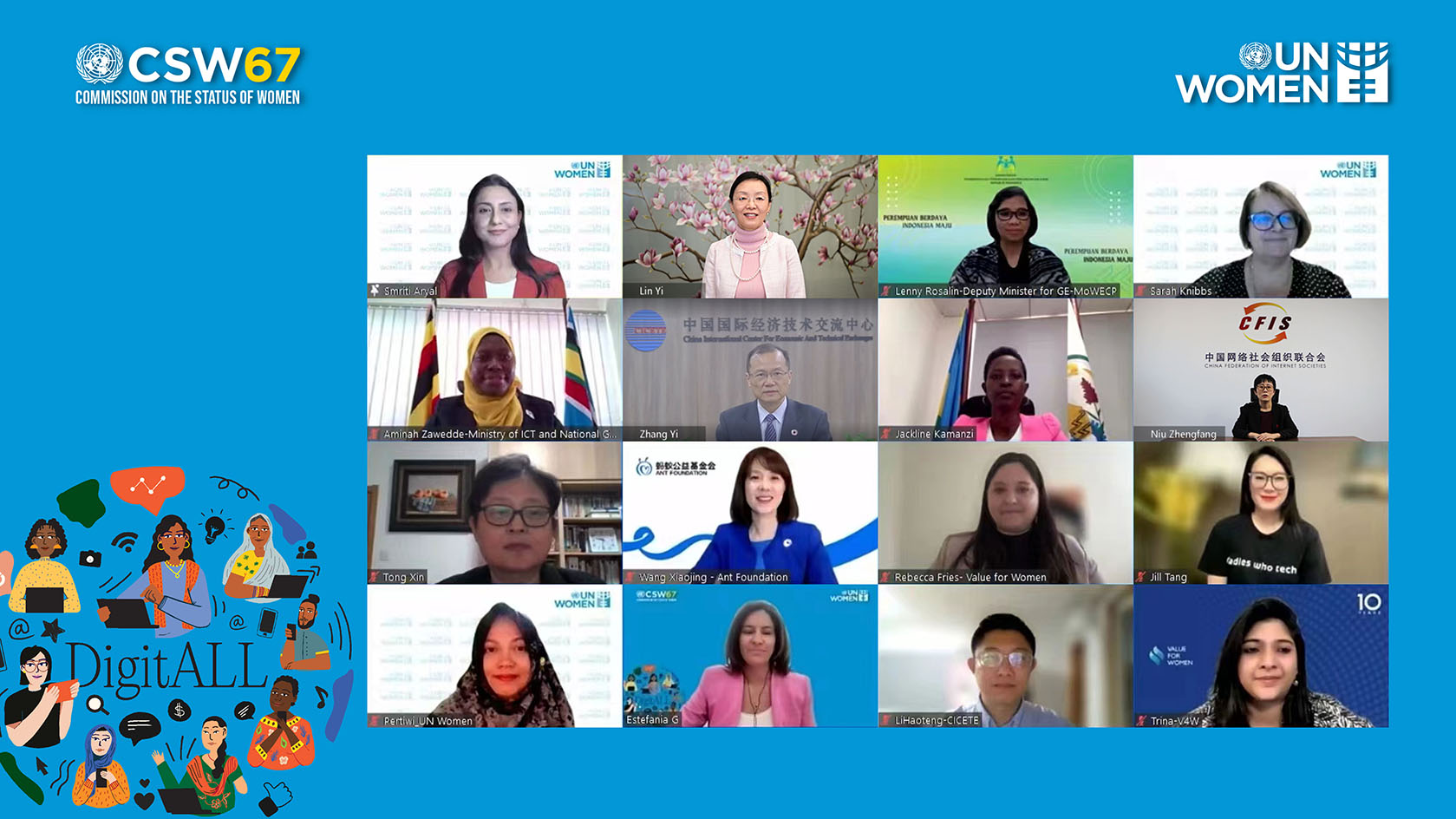
[Online] Beijing, China — On the margins of the sixty-seventh session of the Commission on the Status of Women (CSW67), held from 6 to 17 March 2023 under the priority theme, “Innovation and technological change, and education in the digital age for achieving gender equality and the empowerment of all women and girls,” UN Women China hosted a virtual side event, entitled “Bridging the Gender Gap in the Digital Economy: Leveraging technology and innovation to advance women’s economic empowerment in Asia Pacific and Africa” on March 16.
The event was co-organized by the UN Women China Office, the China Federation of Internet Societies, the Ministry of Women Empowerment and Child Protection of the Republic of Indonesia, and the Ant Foundation. High-level government officials from China, Indonesia, Rwanda and Uganda, as well as representatives from the academia, civil society and the private sector, came together to address challenges, opportunities and effective ways to harness technology and innovation to bridge the gender digital divide, ensuring that women are not left behind in the digital economy and society. The event reached nearly 1.2 million people online.
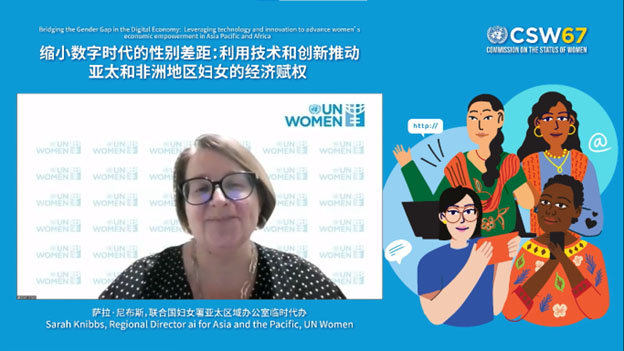
During the opening session, Sarah Knibbs, Regional Director a.i. of UN Women in Asia and the Pacific, emphasized that with just under eight years to achieve the Sustainable Development Goals, it is more important than ever to address the gender gap in digital access and skills and mainstream gender perspectives into national digital strategies.
Lin Yi, Vice-Chair of the National Working Committee on Children and Women under the State Council of China, underlined the necessity of developing digital education and training for women and enhancing international cooperation for women in the digital sector. She also highlighted the importance of creating a more women-friendly environment and providing stronger support to promote women’s participation in the development of science and technology and the digital economy to achieve women’s economic empowerment.
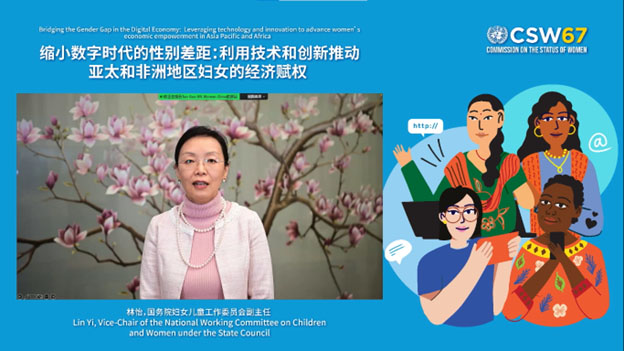
Lenny Rosalin, Deputy Minister for Gender Equality from the Ministry of Women Empowerment and Child Protection of the Republic of Indonesia, also stressed that “the strong will of women has kept economic resiliency in place during the last covid pandemic, as well as their potential to contribute to future economic stability through their entrepreneurship activities. Digital transformation and financial inclusion have proven effective tools for enhancing women’s businesses. Thus, global policies and actions should then focus on closing the digital gender gap by making digitalization women-friendly and by making women entrepreneurs digitally literate.”
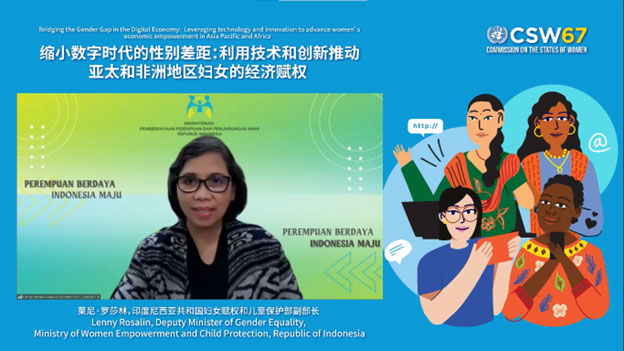
The side event also featured the presentation of the key findings and recommendations of the UN Women’s Multi-Country Study on Women-Led Micro, Small and Medium-size Enterprises (MSMEs) in China, Indonesia, Thailand, Rwanda and Uganda, which provides critical insights for the design and implementation of programmes, initiatives and strategies supporting women’s entrepreneurship. The study is a key output of the Together Digital programme, a five-year regional programme launched in 2022 by UN Women and the Ant Foundation to empower women-led MSMEs to participate and thrive in the digital economy.
The event also highlighted key gender-responsive policies, strategies and good practices from targeted countries and sectors to enhance the participation of women, including youth, in the digital economy and the critical role of technology and innovation in advancing women’s digital and economic empowerment in the Asia-Pacific and African regions. Leveraging public-private partnerships was also underlined by representatives from the public, private and civil society sectors as a key strategy to enhance women’s access to resources and opportunities in the digital economy.
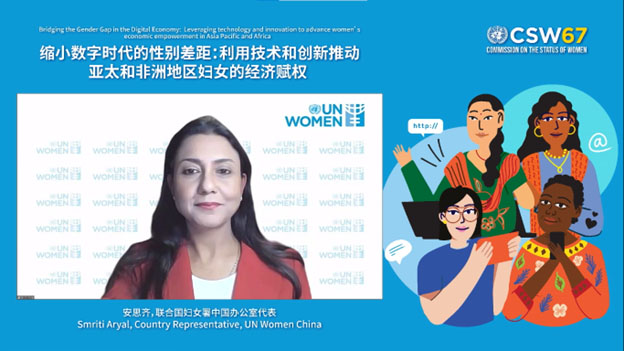
In her closing remarks, Smriti Aryal, UN Women Representative in China, emphasized the importance of whole-of-society and multi-stakeholder approaches to foster collaborations across different societal sectors and combine knowledge, skills and resources towards concrete actions to bridge the gender digital divide. Aryal also stressed the importance of listening to the experiences of women and ensuring they have a seat at the table.
The side event concluded with a call to action to key stakeholders—including government, business and civil society – to take concrete actions to bridge the gender digital divide to ensure women’s equal access to education, training and economic opportunities, including employment and entrepreneurship.
See also